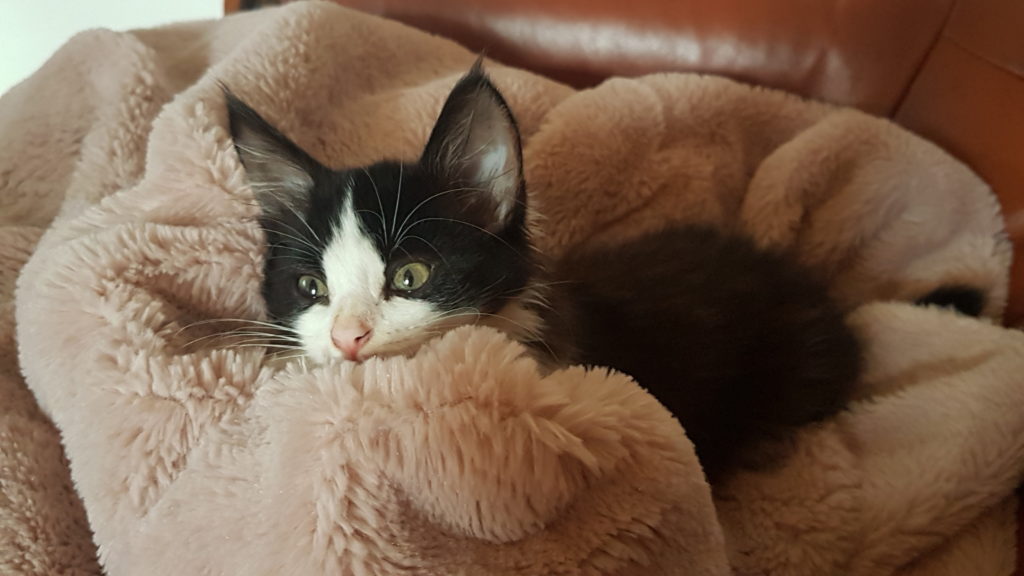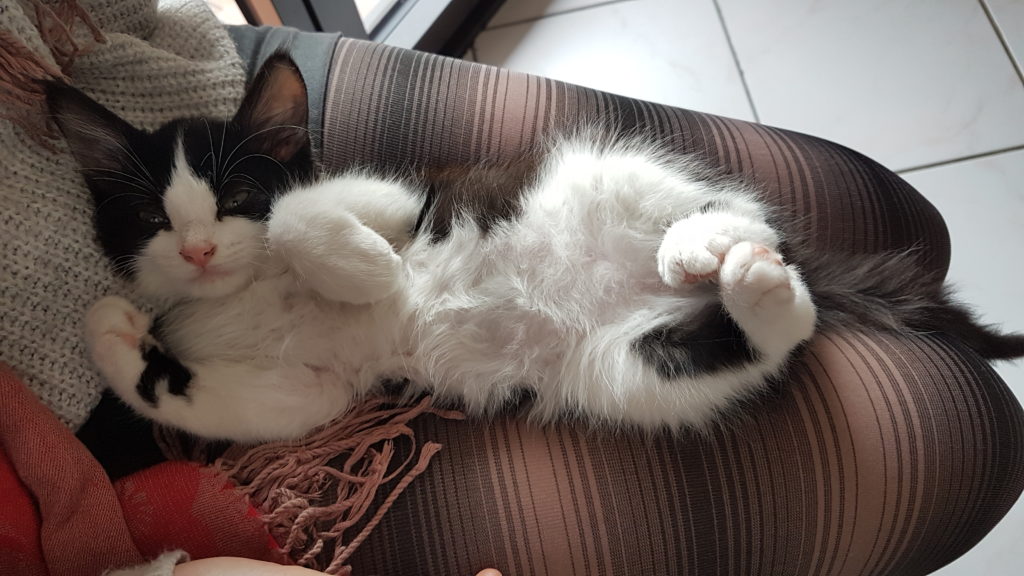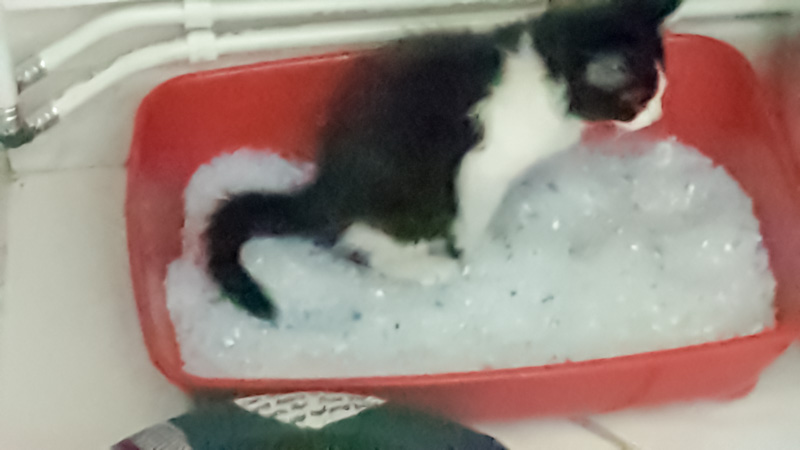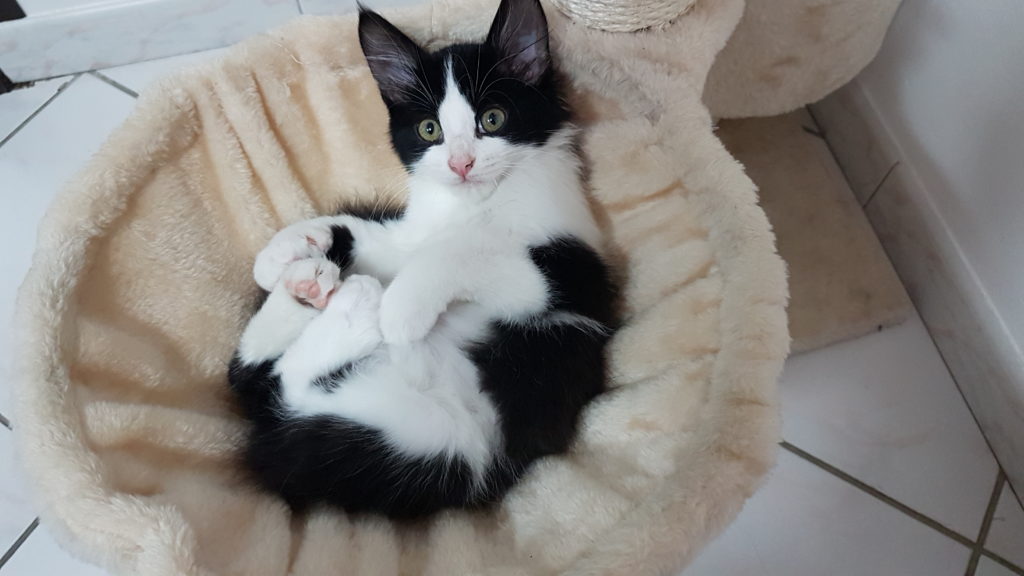You have a kitten urinating in the house, pooping everywhere, peeing on the bed, in short your kitten is not clean. This happens quite often when a kitten is adopted that is too young or the breeder has not properly accustomed the kitten to going in the litter box.
But don't worry, a kitten learns how to be clean quickly and easily. Here are my tips and advice to know how to get your kitten used to litter.
At what age does a kitten learn to potty?
Normally a kitten learns potty training from its mother during his first 2 months.
In fact, from birth, the cat grooms her kittens and quickly teaches them how to clean their coats. By observing their mother cleaning up secretions, kittens naturally learn to be clean. And when kittens see their mothers using the litter box, they follow suit and quickly understand that the litter box is where they need to urinate and defecate.
And since kittens become continents (they can refrain from urinating) between 3 and 5 weeks, they can therefore get clean very quickly. Some become it from 1 month!
At what age does a kitten become clean?
In general, a kitten becomes clean between 1 and a half and 2 months. So, normally, when adopt a 3 month old kitten, there is no problem because the kitten is already used to going in a litter box. In a few days, the time that your kitten gets used to her new home, he will instinctively use his new litter box to urinate and poop.

Why is my kitten not clean?
Because a kitten naturally learns cleanliness in contact with its mother, especially during weaning period, if he is withdrawn too soon from his mother, if the kitten was abandoned very young, he can develop behavioral problems. This explains why some kittens are messy when adopted too young.
But there are also other reasons that we will cover below:
Kitten peeing on the bed
Sometimes a kitten who is not used to litter box can quickly develop bad habits.
If your kitten is not clean and is going to pee on your bed, it may just be because he finds:
- that your bed smells like you (which reassures him),
- that your bed is soft and comfortable (environment that he appreciates),
- that your bed is absorbent (perfect for its urine).
In order for him to go in his litter box (see tips below), you must in addition to educating him, prevent him from accessing your bed or your room.
Kitten urinating in the house
When a kitten urinates in certain places in the house, it is sometimes also a sign of unease, stress or insecurity.
Indeed, a kitten that is not clean can be disturbed by a change in its routine or in its environment. It is up to you to observe and find what stresses him and know how to reassure him. The use of pheromones can be effective in calming a kitten in a room where it is stressed ...
If your kitten uses its litter box but starts to pee all over your house (angles of walls, table legs, furniture, etc.), it is because it is marking its territory. This is more often the case with male kittens, who are prone to this type of behavior. See my article: How to stop a cat from peeing everywhere?
Kitten pooping everywhere
It's very rare, but when a kitten poops anywhere other than in the litter box, it's often a sign that it's sick. I therefore recommend that you seek the advice of your veterinarian.

My kitten is not clean - Importance of litter
To get your kitten used to going in its litter box, there are a few tips that will make this learning easier.
Getting your kitten used to litter - Which litter box?
Choosing the right litter box that will suit your kitten perfectly is important to make it easier for them to get used to it.
For her first litter box, try a closing box first. Indeed, this type of litter box is perfect for kittens who feel a little sheltered and protected. However, some kittens hesitate to enter it the first few times. You don't have to keep it closed all the time. It will depend on your kitten.
Either way, closed or open, the litter box should be large enough for the kitten to feel comfortable in and roll over inside. He must be able to enter and exit easily. It will therefore be necessary that the tank is not too deep.
Getting your kitten used to litter - What type of litter?
The quality of the litter is very important because it is often because of a bad litter that the kitten will give up going there.
I therefore recommend that you choose a litter whose content will not attack your kitten's lungs and which is very very absorbent (see brand below).
My tip to make it easier for your kitten to go there the first few times is to put a few bleach drops below. Thus, the smell will stimulate your kitten to come into the litter box to urinate and defecate.
Getting your kitten used to the litter box - litter box maintenance
The cleanliness of the litter box is paramount for your kitten to use it because cats hate going to dirty and smelly places.
Dirty areas where urine and droppings are found in the litter should be removed daily using a special litter scoop.
The litter box should be completely emptied and cleaned at least once a week.
Getting your kitten used to the litter box - Where to place the litter box?
Here are some mistakes to avoid when it comes to litter box placement:
- Above all, do not place his litter box next to his food + water bowls.
- Do not place the litter box in a crowded area, where there is traffic and noise. Choose a small corner in a quiet part of the house.
- Do not choose a place that is too crowded because the kitten must be able to access it easily. This place must therefore always remain open so that your kitten can go there at will.

My cat is not clean - How do I teach him about the litter box?
For educate your kitten to go in its litter box, you will have to put it in its litter box after each meal and wait 1 or 2 minutes. As soon as your kitten does in his litter box, you will have to praise him and reward him with a treat.
For more efficiency, you can put your kitten in its litter box after each nap, each play session or as soon as you see that it needs to pee.
If, after several weeks of learning, you catch your kitten urinating elsewhere than in its litter box, you will have to say NO to it in a firm and authoritative tone and place it in its litter box. By repeating these actions, your kitten will understand that he must do in his litter box.
As with all learning, you will have to be patient because some accidents can happen. If this is the case, never put your kitten's nose in his pee because he is unable to understand why you are doing this. The risk is that he starts to stress, that he starts to fear you and that he is afraid of you ... And there, the opposite effect can occur: he will urinating all over the house because of his state of stress and anxiety!
If your cat is not clean, you are probably interested in knowing how to get rid of urine odors: How to remove cat pee odors?
And if you want to educate your kitten while he is small: How to train a kitten in 15 minutes a day?

